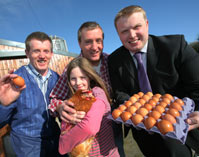Superquinn is first Irish retailer to dump cage eggs

Irish supermarket chain Superquinn has become the first in the Republic to move to selling only cage-free eggs, a decision driven by customer demand, it claims.
From November, all fresh eggs sold in its 23 stores are from free range, organic or barn-kept hens. And in a bid to dispel the fears of some consumers about the cost of the changeover, it promises no price increases.
According to the chain’s fresh food buyer, Sam Donaldson, today’s consumers are well informed about the issues surrounding caged hens. “Our customers weren’t just expressing concerns, they were making sure we got the message,” he said.
“We found that 90% of our fresh eggs sales were already free range or organic, so it made absolute sense to take the next step.”
The chain estimates it will sell 2.4m packs of cage-free eggs over the next year, amounting to some €5.5m (£5m) in turnover.
For Superquinn’s long-time supplier, Greenfield Foods, the changeover has meant an reorganisation of its current production system and an investment of around €350,000 (£316,000). Greenfields, based in Monaghan, also supplies Irish market leader Tesco, but doesn’t expect it to move to cage free until its parent company in Britain decides to do so.
The Irish eggs sector has a farm-gate value of €60m, with Greenfields, which has a staff of 70, accounting for about 50% of the trade.
According to its co-owner, Gerard Caulfield (pictured with his daughter, Laura, co-owner Fergus Caulfield and Superquinn fresh food buyer Sam Donaldson), it handles around six million eggs a week and has a network of more than 80 producers, in both the Republic and parts of Northern Ireland.
Business is good, he says, with retailers reporting that egg sales have remained stable, despite the Republic’s severe economic recession, with widespread pay cuts and job losses. But a shadow over the sector is the EU directive to outlaw caged systems from 2012, a ruling that will require major expenditure by producers.
He described as “just a toe in the water” the investment to meet the Superquinn change compared with what will be needed to comply with the directive. He estimates the conversion cost to the sector at over €30m (£27m), with Greenfields alone facing a €9m (£8m). bill. So far, the state has offered to meet 40% of the overall cost.
